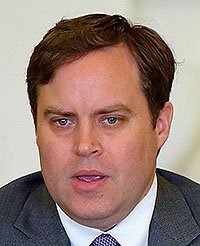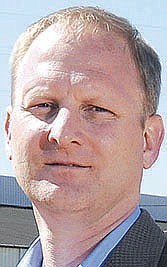FAYETTEVILLE -- Former Sen. Jon Woods and two others indicted in a kickback scheme go before a U.S. magistrate for arraignment this afternoon.
Meanwhile, efforts to eliminate the state General Improvement Fund, which Woods is accused of abusing, have stalled in the Legislature. And a lawsuit challenging the legality of how the improvement fund money is distributed sits before the state Supreme Court.
Fraud, money laundering
Fraud carries a maximum sentence to 20 years in prison and a fine of up to $250,000, according to federal guidelines. Money laundering has a maximum sentence of 10 years and a fine of $100,000. Either the prison term, the fine or both can be imposed for each count.
Source: Staff report
Woods; Oren Paris III, president of Ecclesia College in Springdale; and consultant Randell G. Shelton Jr. of Alma are set to appear before U.S. Magistrate Erin Setser at 1:30 p.m. today.
Woods of Springdale is accused of 12 counts of fraud and one count of money laundering. Paris and Shelton also are charged in 10 of the 12 counts of fraud.
The three men are accused of arranging payments to Woods and then-state Rep. Micah Neal, R-Springdale, in return for their steering state money to the private, Christian college. The March 2 indictment doesn't name the college but says Paris is the president of it.
Neal pleaded guilty Jan. 4 to one count of taking kickbacks for his part in the plan. Shelton is accused of taking the kickback money through his consulting firm to pass along to Woods, keeping a portion for his business.
The grants involved were all issued from 2013 to early 2015. Ecclesia received improvement fund money totaling $717,500, records show.
Woods, a Republican, is accused of also receiving a kickback from a private nonprofit job training corporation that received a $400,000 grant. Woods was paid the kickback, the indictment says, from a businessman who hasn't been charged. Neal also received a kickback from that source, according to his guilty plea.
The indictment doesn't name the business involved but says Woods and Neal each contributed a portion of the grant. Grant documents and a state audit show the only job training program to receive the backing of both Woods and Neal that received $400,000 during the 2013-14 time period was AmeriWorks Inc. of Bentonville.
Neal pleaded guilty to taking $38,000 in kickbacks, according to his plea. Woods received an undisclosed amount of money, much of it in cash, but one wire transfer from Shelton's company totaled $40,000, the indictment claims.
An effort to eliminate individual lawmakers' control of the fund isn't going to make it through the Legislature this session, sponsor Sen. Trent Garner, R-El Dorado, said of Senate Bill 325.
"I am disappointed to say that it doesn't have the support to get through the budget committee," Garner said.
His bill would have put unspent money from other state budgets and interest earned on state accounts -- the sources of the General Improvement Fund -- into a special fund requiring a super-majority vote of the Legislature to spend.
The governor's administration didn't support the bill, saying it was too restrictive, he said. Gov. Asa Hutchinson included no improvement fund money in his proposed budget and has said he opposes such spending in principle.
By law, the governor receives a share for distribution of whatever money is appropriated into the fund with the rest going to the Legislature for local grants. The legislative portion has been as high as $70 million for a two-year state budget cycle in recent years.
Local legislators -- 35 state senators and 100 state House members -- then recommend which projects should receive that money.
Lawmakers opposed to Garner's bill, such as Sen. Larry Teague, D-Nashville, said Monday there was no need to hurry and pass a bill when there was no local project money in the budget anyway.
Garner argued having the prospect of money to spend for these projects would only make it more difficult to get any lasting change, and passing the law now when it would not take money away was the best time.
Teague will propose a change in Senate rules in which a public record will be kept of what projects are approved by its members, he said. Problems with the fund largely stem from the lack of any such statewide record-keeping, he said. He considered introducing a bill to that effect but decided against it, saying he thought it would be unwise for a senator to propose a law mandating what records the House should keep on its members.
The Legislature used to approve grants directly, but that was found to be unconstitutional local legislation in a 2005 lawsuit upheld by a state Supreme Court ruling in December 2006. State money is supposed to go to projects with a statewide benefit, the court found.
In 2007, the Legislature adopted the current system of parcelling out their share of money for local projects to the development districts. Those eight districts cover the state and encourage regional cooperation on economic development. Although the grants go through the districts, lawmakers determine who get the grants.
According to the indictment, each legislator gets responsibility for distributing a portion of the money.
Wilson challenged that method too but lost a Pulaski County Circuit Court ruling last year. He filed his appeal to the state Supreme Court earlier this month, he said in a telephone interview Monday.
Lawmakers still control the awarding of improvement fund grants, and both the federal indictment of Woods and Neal's guilty plea say so, Wilson said. Local district boards don't go against the will of the lawmakers they depended upon to appropriate the money, he said.
The change made accountability worse in many ways since spending and record-keeping was dispersed among eight districts with little oversight.
"There's no legal leeway for the Supreme Court to consider recent developments such as the indictments in their deliberations, which will be on points of law from the original case," Wilson said, also noting the charges against Woods are still pending.
The court does have the right to take "judicial notice" of any developments in the current Legislative session, he said, such as any effort to appropriate money for local projects. There is at least one bill before the Legislature that would do so, he said. It is House Bill 1704 by Rep. Lane Jean, R-Magnolia, which would give $8 million in general improvement money to each development district.
"A lot of things get passed in the last two or three days of a session, when nobody's paying attention," said Wilson, a former state House member. "If that happens, I'm hoping the court will take judicial notice." This would bolster his case by allowing the courts to consider the Legislature's decision to continue putting money in the fund, he said.
House Bill 1704 includes a lot of specifics on how the money is to be spent in response to recent abuses, he said, demonstrating the desire of the Legislature to control the spending.
The indictment and guilty plea vividly show problems in the existing system, Teague said, but those problems can be addressed.
"This program is a great help to my local fire departments and little towns," he said. "There's value to the General Improvement Fund, but the dollars need to be tracked."
Garner said he wouldn't give up on reforming the system. He also said the public expects the Legislature to act in view of Neal's plea and Woods' indictment.
"I can personally guarantee I'll be trying again next session," he said. "I know there's a large number of good projects and that almost all lawmakers use this as intended, but it's a flawed system on a number of fronts. I do not intend to let this go."
NW News on 03/28/2017


